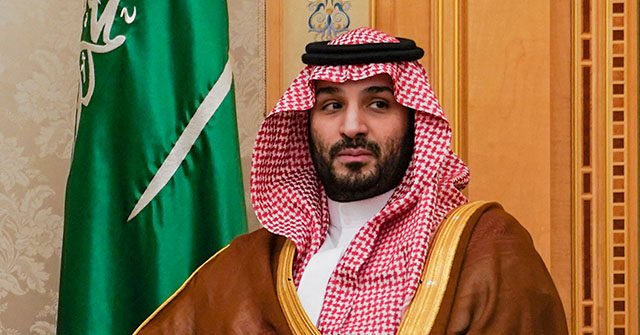Saudi Arabia’s Neom project was meant to be the city of the future, the crowning achievement of Crown Prince Mohammed bin Salman’s “Saudi Vision 2030” plan to diversify the national economy away from oil.
A Wall Street Journal exposé revealed that the construction site for the city of the future has been plagued by complaints of gang rape, drinking, drugs, and attempted suicide by the 100,000 workers assembled there.
The Neom project began at the northern tip of the Red Sea in 2017, billed as a carefully planned megacity constructed with the latest technology that would sprawl over 10,000 square miles. The name is a portmanteau of the familiar Greek prefix “neo” for “new,” plus the Arabic word “mustaqbal,” which means “future.” In a happy coincidence, “M” also happens to be the first letter of the crown prince’s name.
Crown Prince Mohammed bin Salman (MBS), the de facto chief executive of Saudi Arabia and architect of its economic transformation, envisioned the city as both a statement of the kingdom’s financial might and an opportunity to bring in more foreign investment.
MBS hoped those investors would be attracted by Neom’s futuristic style and its “nature-friendly” construction, including an emphasis on using solar and wind power. The project also touted “social responsibility” in its construction project, producing annual reports of the amenities and educational opportunities provided for its vast workforce.
The Wall Street Journal (WSJ) on Saturday published a dismaying report that described the reality of building Neom as something closer to “dystopia.” The project made a highly public effort to avoid the accounts of exploitation and poor working conditions surrounding other big construction efforts by Saudi Arabia and the other Gulf monarchies, but the same stories have poured from the Neom work site:
Neom employees have reported incidents of gang rape, suicide, attempted murder and drug dealing on the site, slated to cover an area the size of Massachusetts. Last year, a McKinsey consultant died in a head-on crash at night even after safety staff warned Neom management about the danger of driving late on the region’s roads. Laborers at one of the migrant worker camps mounted a violent protest over frustration with food. Children as young as 8 have been caught driving trucks.
Some of this appears to be a consequence of the management frequently seen with major Saudi projects, leading to “cost overruns, staff turnover, and a culture of bullying and harassment.” Unflattering press coverage, including from the WSJ, has forced several executives for Saudi Arabia’s most prestigious project to resign.
Ironically, one of the biggest problems with Neom is that the construction site for the elegantly designed city of the future was very poorly designed. The workforce lives in a ramshackle collection of overcrowded modular structures with low safety standards and almost no provisions for emergency services.
The Neom site finally has its own hospital, with ambulances and emergency helicopters, but workers told the WSJ the project “continues to have trouble preventing and responding to accidents.”
This difficulty is partly due to the remote location of the work site, which is meant to become a titanic city someday but is currently far from any capable city administration. The local residents are a tribe called the Huwaitat, who were not happy to see their ancestral lands bulldozed. The Saudi government was not terribly interested in their objections, forcibly evicting many of the Huwaitat from their homes and charging those who resisted with terrorism.
There are not many traffic cops in the area, and those who work the Neom beat have been rumored to drive right past traffic accidents they did not feel like dealing with.
Neom has a reasonable level of reported workplace injuries for a project of its size, the Journal observed, but it has a high number of traffic accidents and fatalities, caused by everything from small children driving huge commercial vehicles to poorly lit roads that end abruptly, catapulting speeding cars into the untamed wilderness. Commuting from the work site to the nearest established city is a two-hour drive that turns into a white-knuckle thrill ride on the Neom end of the trip.
The original temporary housing camps for workers were reportedly fairly well designed and built but, as the size of the workforce swelled, far less safe and comfortable “unofficial” camps appeared. Saudi Arabia’s prohibition against alcohol was not vigorously enforced in the camps, so drunken misbehavior proliferated, and drug abuse soon followed. 2023 saw a significant rise in workplace injuries and fatalities, including incidents at various offshore construction projects, where the lack of rescue services was especially acute.
Human Rights Watch (HRW) in early December published an even more scathing report about Neom, titled “Die First, and I’ll Pay You Later.” The title was a sarcastic remark made by a Saudi manager to a Nepalese worker upset about his unpaid salary.
According to HRW, Saudi Arabia’s generally poor treatment of migrant workers has continued with the $500 billion Neom project. Foreign workers at the Neom site complained of being paid much less than they were promised, and their workload has steadily increased as major deadlines for the project approached.
“They give us a daily target, which we have to meet anyhow. The supervisor does not treat us well. They make us overexert ourselves. We cannot stop during work hours. We have to continuously work,” said one Neom construction worker.
Workers at Neom, like other major Saudi projects, complain they are not allowed to change jobs and are threatened with financial penalties if they quit, even though Saudi Arabia passed labor reforms in 2021 to outlaw such practices.
